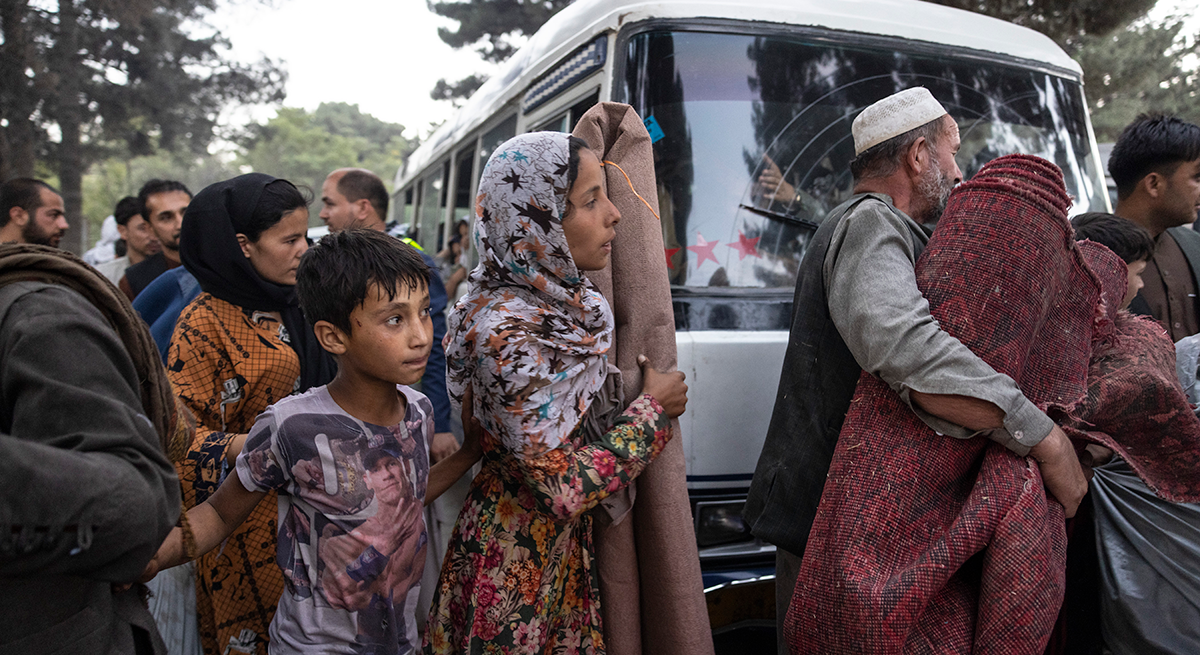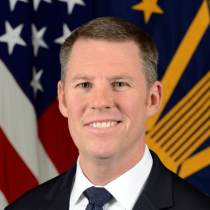

Introduction
Weeks before the official U.S. military withdrawal, Afghanistan is unraveling rapidly as the Taliban continue their swift military advance. They now control more than two-thirds of the country and half of the provincial capitals. With the government’s hold on Kabul in doubt, the Biden administration has dispatched troops to evacuate U.S. citizens from the country. We asked experts and scholars from across MEI to weigh in with their thoughts on the situation and what it means for the country, the wider region, and key international players.
Photo by Paula Bronstein/Getty Images
Viewpoints
-
Marvin G. Weinbaum
Marvin G. Weinbaum

The unraveling of the Afghan Islamic Republic
Once the U.S. had signed its “America First” exit deal with the Taliban, drew down its troop level to 2,500, announced a date for a full withdrawal, and indicated its critical air power support would soon go as well, a grim outcome in Afghanistan was foreseeable. What was never expected was the speed at which Afghan security forces would collapse when faced with an intensified Taliban push. Also unanticipated was the swiftness with which regional and local militias, the Kabul regime’s supposed second line of defense, would give way as well. The government’s very recent call for the mobilization of a popular uprising to confront the enemy was clear testimony to its desperation.
Most seasoned observers had expected to see an end game something akin to a replay of the late 1990s. Although a Pashtun dominated south was quickly overrun, it then took two years for the Taliban to capture Kabul and five more before a loose alliance of warlord-owned northern militias fully yielded to the insurgency. This time an ethnic character to the civil war has been far less in evidence as large numbers of Tajiks and Uzbeks have reportedly aligned with the Taliban attackers. Another ethnic minority, the Hazaras, has more reason to resist a Taliban takeover. While the other ethnicities share with the Taliban a Sunni identity, the Shiite Hazaras fear a Taliban with a score to settle. In the late 1990s, these bitter adversaries were known to have committed atrocities against each other’s prisoners.
Meanwhile, as events are unfolding in Afghanistan, a wide array of diplomats is gathering in Doha in the apparent belief that a genuine power-sharing arrangement with the Taliban may still be possible. Interestingly, Taliban negotiators have remained in Doha despite the breakdown of the last round of peace talks. This has left open the intriguing possibility that with the conflict’s outcome in Afghanistan becoming brutally obvious, the Taliban leadership may offer a peace deal that however packaged amounts to terms for a regime surrender. While those speaking for the Kabul government will no doubt resist capitulation, Afghans have a deep tradition, all too observable currently in cities across the country, of not fighting to the last man.
Whatever happens, the Biden administration appears fully determined to complete its military disengagement. Even with a U.S. investment of 20 years at stake and the unfolding of a deep humanitarian crisis, Washington’s resolve has not been shaken. The just announced deployment of several thousand American troops to the Afghan capital is exclusively to safeguard the evacuation of U.S. Embassy personnel. Repeated assurances that a U.S. withdrawal from Afghanistan would never resemble the last images of a collapsing Saigon now seem hollow. The difference this time is that rather than helicopters and an embassy roof being the site of the last departures, it will be a hasty liftoff of huge planes from the tarmac of a besieged Kabul airport.
Marvin G. Weinbaum is the director for Afghanistan and Pakistan Studies at the Middle East Institute.
-
Charles Lister
Charles Lister

A Taliban victory would be a major win for the global jihadist movement
The Afghan government appears to be in a state of precipitous collapse. At least a dozen provincial capitals have fallen to the Taliban in a week. The Taliban now control around 66% of the country. When President Joe Biden announced the U.S. withdrawal four months ago, that number stood at 15%. As the dominos fall, this week’s worst-case intelligence assessment that Kabul might fall within 30 days looks to have been decidedly optimistic. Some Taliban frontlines are now less than an hour from the capital, where U.S. troops are now being dispatched to secure a mass evacuation of the Embassy — which may move to Kabul’s Airport.
That is a damning symbol of the disaster that this premature, largely unconditional, and illogically hasty withdrawal has been. An eventual withdrawal was a legitimate and likely right objective, but this was not the way to do it. This was a major foreign policy decision taken largely with domestic politics in mind, and that “progressive” experiment has clearly failed. From an administration that prides itself on human rights, humanitarianism, and liberal, democratic values, spare a thought for the millions of women and girls now facing a life under the Taliban’s medieval, violently misogynistic rule. Abandoning millions to such a fate doesn’t strike me as particularly “progressive” or responsible.
The Taliban’s exponential expansion in recent weeks has a lot to do simply with momentum. With each battlefield victory, the group’s ability to coerce the mass surrender of government forces has grown markedly. Some key districts have fallen without a bullet fired. But with each victory, the group has also been acquiring access to an enormous amount of heavy weaponry. From publicly available imagery alone, the group has captured nearly 2,000 U.S.-made Humvees, MRAPs, ATVs, AFVs, and pick-up trucks, as well as tanks, heavy artillery, and at least one helicopter. That makes ISIS’s weapons seizures in Syria and Iraq in 2014 look trivial. Worse still, the Taliban’s fighting force has been swelled by thousands of fighters released from more than 10 recently captured prisons.
A Taliban-dominated Afghanistan promises al-Qaeda a guaranteed safe haven and desperately needed breathing space after two decades of relentless U.S. counterterrorism pressure. Al-Qaeda still owes the Taliban an oath of allegiance — that relationship was never going to be broken by negotiations with the West. The intelligence community’s capacity to monitor and intercept terrorism threats across Afghanistan has taken an enormous hit in 2021. Al-Qaeda strategists will have rarely been so happy since 9/11. That a Taliban victory looks possible before 9/11’s 20-year anniversary will be celebrated by jihadists worldwide. It is impossible to understate how significant this is likely to be for the jihadist movement worldwide — it will be reaped for years, if not decades, to come.
Charles Lister is a senior fellow and the Director of the Syria and Countering Terrorism & Extremism programs at the Middle East Institute.
-
Mick Mulroy
Mick Mulroy

Now is the time for difficult conversations
The debate about whether Afghanistan was worth thousands of U.S. lives and a trillion U.S. taxpayer dollars should have occurred before those lives were lost and the money was spent. The decision to pull out our remaining 2,500 troops was made after all of that was done. That minimal number of troops preserved everything we fought for in the last two decades. We had significantly reduced the risk to our forces and the expense to the U.S. taxpayer.
The decision to withdrawal was made despite the advice of most national security advisors, past or present. What is happening now is not a surprise. It was predicted. If anything, it is happening faster than predicted. But we are not seeing the worst of it. The Taliban is not only taking territory, they are killing people with the weapons we provided. If we ever have to go back in, it will be against a Taliban better armed and equipped than ever before.
The question now seems to be when do we depart. Do we leave now or wait until the country is in full crisis and the situation resembles the fall of Saigon? Then the international community will wring its hands for decades about yet another human crisis caused by humans. It is difficult to see the U.S. reversing course and sending forces back in, especially against a Taliban with all the momentum and an army that is growing by the hour. It is also difficult to see the U.N. or any of its members agreeing to a peacekeeping force for the same reasons.
But we need to be having these conversations now, as uncomfortable or difficult as they may be, or the only issue we will have to decide is who takes down the flag.
Mick Mulroy is a former Deputy Assistant Secretary of Defense for the Middle East, Afghanistan veteran, Senior Fellow at the Middle East Institute, and ABC News National Security Analyst.
-
Shanthie Mariet D’Souza
Shanthie Mariet D’Souza
A “test case” for India’s great power aspirations

On Aug. 11, as the Taliban continued their military blitzkrieg and territory-capturing spree, gradually closing in on Kabul, New Delhi asked its citizens to start preparing for evacuation from the war-torn country. A day later, Taliban fighters posed in front of a seized Mi-24 helicopter, which was reportedly gifted to Afghanistan by India. In New Delhi, there is a sense of panic for obvious reasons. It has already shut down three of its four consulates. As the largest regional donor, India had pledged more than $3 billion through various aid and development assistance programs that had wide acceptance among the Afghans. The impending fall of Kabul does not have any immediate security implications for New Delhi, but there is an overwhelming sense of helplessness as its contributions and gains made in the last two decades wither away.
Since the U.S. concluded its peace agreement with the Taliban in February 2020, New Delhi’s foreign policy has vacillated from trying to convince Washington not to implement an arbitrary exit plan to trying to open a channel of communication with the insurgents. As the influence of Pakistan and China has steadily grown in Afghanistan with the prospects of a Taliban takeover, these measures have had little effect either on the Biden administration or the Taliban. Caught between its own internal contradictions of whether to augment its symbolic military assistance to the incumbent government in Kabul, which would further increase the schism between New Delhi and the Taliban and make it a party to the conflict, or to take umbrage under its proclaimed support for an “Afghan-led, Afghan-owned, and Afghan-controlled” peace and reconciliation process, New Delhi’s last-ditch diplomacy in Iran, Qatar, and Russia too has not heralded much hope, nor made any difference to the developments on the ground.
In a matter of days, Afghanistan’s political future may change significantly. The mostly-redundant Doha process or even the regional efforts led by a host of countries now essentially resemble instruments to ensure a soft landing for the Taliban in Kabul and legalize their forceful capture of power. While New Delhi will have to look for other options, it will rue its chances of not doing enough to prevent the slide of a friendly neighbor of strategic significance. The loss of Afghanistan will not only reflect on the leadership potential of India as a rising power, but also on the commitment of a strategic partner with which Afghanistan had signed its first strategic partnership agreement in October 2011.
As a member of the U.N. Security Council, India has a rare opportunity to rally an international consensus against Afghanistan’s forceful takeover by the Taliban. Within Afghanistan, it can still play a role as an enabler and facilitator in strengthening the Afghan government’s position, building an intra-Afghan consensus to stop the forceful takeover by the Taliban, and supporting an indigenous and inclusive peace process. Whether India chooses to do this or simply continues with its “wait and watch” policy will have a telling effect on its great power aspirations. China’s and Pakistan’s strategic gain in Afghanistan would lead to a strategic and democratic loss for India and U.S. in South Asia.
Shanthie Mariet D’Souza is a Founding Professor, Kautilya School of Public Policy, Hyderabad; founder and president of Mantraya, an independent research forum; and a non-resident scholar at the Middle East Institute.
-
Syed Mohammed Ali
Syed Mohammed Ali

Pakistan’s position on the Taliban surge
The decision to proceed with the withdrawal of U.S. troops in the absence of an intra-Afghan power-sharing agreement had boosted chances of the emergent Taliban ascendency, yet the speed with which the Taliban have secured territorial gains has caught everyone by surprise. The swiftness of Taliban gains, which includes the takeover of 12 of Afghanistan’s 34 provincial capitals, including the second and third largest cities (Kandahar and Herat), cannot be attributed to support by neighboring Pakistan. Many of the gains made by the Taliban are in non-Pashtun areas, far from the Pakistan border, and have been the result of surrender instead of fighting.
Pakistan managed to bring the Taliban to the negotiating table with the U.S., but it has remained under persistent pressure from the U.S. to do more to ensure a negotiated settlement between the Taliban and the current Afghan government. While diplomatic negotiations are ongoing to create some semblance of order in the country, the success of the Taliban offensive has called into question whether they would agree to joining any power-sharing setup with the existing government led by Ashraf Ghani. The besieged Afghan government continues blaming Pakistan for the Taliban’s belligerent attitude as well as the current territorial gains being made by them.
The Pakistani government, however, maintains that its leverage over the Taliban is limited. Besides betting on the Taliban to maintain strategic leverage in Afghanistan against India, Pakistan perhaps fears that applying more pressure on the Taliban would provoke a merger between the Taliban and its own local militant factions, especially the Tehreek-e-Taliban. Over the past few years, the Taliban have also created links with many other regional powerbrokers, so they are not entirely beholden to Pakistan. The Taliban seem to have succeeded in negotiating with many local warlords as well, who have chosen to lay down arms over this past week or so, instead of putting up a serious resistance.
With popular backing, Pakistan’s government has refused to allow American military bases to operate from its soil after the U.S. troops pull out from Afghanistan. Many Pakistanis also feel that their country is being unfairly scapegoated and blamed for the American failure in Afghanistan. Pakistan’s foreign minister has recently reiterated that Pakistan can still be a facilitator of Afghan peace, but not its guarantor.
Afghanistan itself is experiencing the heaviest toll of the escalating Taliban surge, but the forceful takeover of the country will also become a problem for Pakistan. A repressive Taliban regime, or even lingering fighting to resist complete Taliban domination, will inundate Pakistan with another refugee wave, which is already weary of the estimated 3 million Afghan still residing in the country due to preceding conflicts.
While regional states such as Iran, India, Pakistan, China, and Russia have their own preferences and agendas, most of these states could be brought around to endorsing a locally owned negotiated settlement in Afghanistan. Pakistan cannot arm-twist the Taliban into laying down arms and accepting a power-sharing formula that does not sufficiently placate their political ambitions. Nonetheless, Pakistan still has an important role to play in nudging the Taliban to engage with representatives of the existing Afghan government and other local stakeholders, especially if the Taliban’s demand to replace Ghani as the head of government is accepted.
Syed Mohammad Ali is a professorial lecturer of anthropology at George Washington University and a non-resident scholar at the Middle East Institute.
-
Fatemeh Aman
Fatemeh Aman

Shock and surprise in Iran
The Taliban’s extraordinarily quick advance has shocked not just Afghans, the U.S., and neighboring countries like Iran, but possibly even the Taliban themselves. They likely did not expect such a quick victory.
For Iran, like many other regional players, the main feeling now is surprise. The Iranians had been getting cozier with the Taliban, but it seems the Taliban may have played them and now they’re going to have to deal with the resulting refugee crisis. This is likely to be a major crisis and will only be exacerbated by the pandemic, particularly given the current surge in COVID cases in Iran. This is not what the Iranians expected. They thought they were getting closer to the Taliban and would deal with them diplomatically to secure their borders, but this generation of Taliban seems to have even less respect for diplomacy than the Taliban did back in 1998, when they killed the Iranian diplomats in Mazar-i-Sharif. Iran now may have lost any remaining trust on the part of the Afghan people.
This generation of Taliban seems even more brutal than that of the 1990s and includes extremists from across Central Asia. By their treatment of the Afghan people and the manner in which they are advancing, they seem to have no respect for international relations. They don’t care whether the international community maintains ties with Afghanistan and don’t have any concern about being sanctioned or isolated from the rest of the world.
There is a blame game going on now within Afghan society, and while Afghans are blaming the U.S. as well, we should not forget that the country’s ethnic divides have played a major role in the Taliban’s victory too.
The situation in Afghanistan will be a stain on the Biden administration, even though the deal with the Taliban was reached during its predecessor. The manner in which things played out and the administration’s lack of flexibility will haunt Biden’s presidency. The example the U.S. has set — of letting its friends down like this — is not a good one, especially as Washington looks to the Central Asian countries as it tries to find a new military base in the region.
We can only hope now that the thousands of troops that are going to be deployed in Kuwait will cause the Taliban to slow down — to at least consider the possibility that those troops could be used against them. For neighboring countries like Iran, their last resort is to try to use any leverage they may have on the Taliban. The Taliban will not stop otherwise.
Fatemeh Aman is a non-resident senior fellow at the Middle East Institute.
-
Maxim Suchkov
Maxim Suchkov

In Moscow, critique, criticism, and concern
The Taliban continue their winning streak over the Afghan military and have captured Kandahar, Afghanistan’s second-largest city. As the fight over Kabul seems imminent at this point, the Afghan government has reportedly offered the Taliban a share in power — seemingly, the only solution able to halt the violence.
The mainstream Russian political and expert narrative over the unraveling situation revolves around three major themes: the critique of the 20-year presence of the United States in Afghanistan; the criticism of the leadership of the Afghan government; and concerns over security of Central Asia following a possible capture of power by the Taliban.
The first line of discussions is primarily targeted at what is seen as the ultimate failure of the U.S. to build an effective Afghan military able to defend against the Taliban. America's attempt at "nation-building" has been subject to sharp criticism from the beginning. Observing how Afghanistan’s very statehood is crumbling in the face of the Taliban offensive, Moscow is now embedding the reasoning of “not only will the Americans not help you, but they will likely make things worse” into its persuasion tactics with the leaderships and/or opposition forces of other conflict-torn countries from Ukraine and Syria to Libya to change their respective calculus on dealing with Russia as an actor that “means business.”
The second narrative directs more criticism toward the Afghan authorities. In the absence of a potent military force and a better political plan to embrace the Taliban, their perceived political shortsightedness and greed for power are seen as significant factors that contributed to the deterioration of the situation. Their willingness to share power with the Taliban at this stage is seen as too little, too late. Yet they may still have a chance, should the Taliban seek to avoid the possibly high costs of a potential fight over the capital city of Kabul.
Finally, the third theme centers around Russia’s own efforts to secure its southern flank. It involves the pursuit of its own “troubleshooting” tactics with the Taliban and beefing up its Central Asian allies. On Aug. 11, Russia completed joint military drills with Tajik and Uzbek troops. The exercises simulated a “joint response to cross-border militant attacks” and involved tanks, armored personnel carriers, Su-25 attack jets, helicopters, and other weaponry, according to the Russian Defense Ministry.
Maxim Suchkov is non-resident scholar at MEI, a senior fellow and associate professor at the Moscow State Institute of International Relations (MGIMO-University), a non-resident expert at the Russian International Affairs Council (RIAC), and an associate research fellow at the Italian Institute of International Political Studies (ISPI).
-
John Calabrese
John Calabrese

Security concerns remain paramount for Beijing
As the Taliban’s relentless march across Afghanistan rapidly advances and U.S. troops deploy to evacuate embassy staff, Chinese officials are more likely concerned than they are elated.
The official Chinese narrative that Afghanistan could play an important role in the Belt and Road Initiative (BRI) as well as in regional economic integration is misleading. Of far greater importance to Beijing than Afghanistan’s economic potential are the immediate implications of a post-U.S. withdrawal power vacuum that could destabilize the surrounding region.
As the battle for the capital city of Kabul seems on track to occur sooner than anyone had expected, Beijing is now forced to react and adapt to a fluid and uncertain situation in Afghanistan and to its region-wide reverberations. At stake for China are the vast investments it has made in infrastructure projects in Pakistan and Central Asia, as well as the safety of Chinese diplomats and workers. At risk is China’s own domestic security if conflict were to spill across the border and/or fuel extremism in Xinjiang Province.
It is these very security concerns that are of paramount importance to China — and that might explain the counterterrorism focus of the recent joint Sino-Russian military exercises. Meanwhile, on the diplomatic front, China has continued to follow an “Afghan-led, Afghan-owned” approach to the struggle between the Western-backed government in Kabul and the Taliban, in keeping with its principle of non-interference in other countries’ domestic affairs. In practice, though, Beijing has hedged its bets — maintaining friendly relations with the Afghan government while engaging the Taliban.
In fact, Beijing’s diplomatic balancing was on full display as recently as last month. Within a span of just 12 days President Xi Jinping, in a telephone conversation assured Afghan President Ashraf Ghani of “China’s firm support”; and Foreign Minister Wang Yi, hosting a high-profile delegation in Tianjin, referred to the Taliban as a “pivotal military and political force.”
Beijing has thus positioned itself to extend formal recognition to the Taliban should the latter succeed in toppling the government in Kabul. As one provincial capital after the other falls in rapid succession to the Taliban, this outcome appears increasingly likely, albeit not inevitable.
In that eventuality, will the Taliban, as Beijing would prefer, embrace the goal of inclusive peace? Will the Taliban honor its commitment not to harbor the East Turkestan Islamic Movement (ETIM)? If the “all-weather friendship” with Pakistan has not shielded Chinese citizens and assets from acts of violence, can warm relations with the Taliban be expected to?
John Calabrese teaches U.S. foreign policy at American University in Washington, DC and serves as a Scholar in Residence at the Middle East Institute, where he directs its Middle East-Asia Project (MAP).











